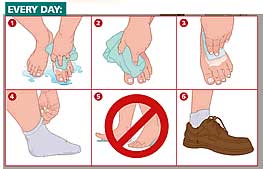Diabetic Foot
Diabetes is a chronic disease which affects a large amount of the population. Insulin is a hormone which helps the body process sugar in the diet. When diabetes is present either the body produces no insulin (type one), or the body is insulin resistant (type two) which means the body can’t use the insulin properly.
If you’ve been diagnosed with diabetes, a podiatrist can offer a large component of foot care. It is important to know if you have diabetes that you could be more prone to infection, have loss of sensation, poor circulation, and other complications such as kidney and eye disease. All of these place you at a higher risk for serious foot infections and potential amputations.
The tissue underneath a corn or callous, for example, could become ulcerated which can increase the chance of invasion by micro-organisms. Before it becomes ulcerated it will be inflamed – symptoms of inflammation include redness, pus, inflammation, pain, heat and/or loss of function. Ulceration is usually very painful, however because some diabetics have decreased sensation they might not feel this pain and it might not realise it has become infected. Infection could possibly spread into the bone which is called osteomyelitis.
Assessment – The podiatrists at toe-tal will provide an individual assessment to establish the circulatory and neurological status of your feet, as well as individualised advice depending on your specific foot care needs.
circulatory and neurological status of your feet, as well as individualised advice depending on your specific foot care needs.
What to do:
- Wash your feet daily
- Dry your feet thoroughly, especially between toes
- Apply moisturizer to your feet (not between toes)
- Wear moisture resistant sock
- Avoid going barefoot
- Proper fitting footwear – poor fitting footwear is one of the major problems. New shoes need to be comfortable when you try them on, you won’t ‘break them in’. Should be plenty of room for the toes, and length and width should be a good fit.
- Inspect your feet daily for sores, cuts, bruises, changes to toenails – if you can’t see underneath your feet use a mirror, or ask a friend or family member to check for you
- Look after your health
- Never try to remove corns and/or callouses yourself
- See a podiatrist (minimum once per year) – this will help to prevent problems from developing. The sooner the treatment the better.
Contact Us.
Please contact the appropriate location for bookings.
Salisbury Medical Centre
PH: 3277 1621 - Fax: 3277 2887
ACE Sports Medicine – Hibiscus Sports Complex
PH: 3349 5733 - Fax: 3349 5122
Acacia Ridge Day And Night Chemmart Pharmacy
PH: 3277 4220 - Fax: 3255 5644
Brisbane Medical Specialists – Tarragindi
PH: 3184 0400 - Fax: 3892 7094
Morningside General Practice Clinics – Morningside Plaza
PH: 3399 4685 - Fax: 3395 7377
Any other enquiries please email info@toetalpodiatry.com.au or call 0422 389 652
